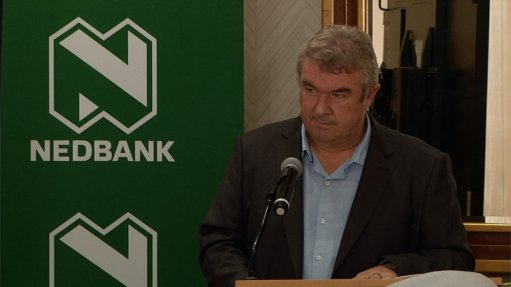
Liquid Intelligent Technologies SA chief strategy officer Dr Willie Oosthuysen
South Africa’s economy has performed surprisingly well lately, with gross domestic product trending at pre-pandemic levels; however, global and domestic challenges, especially energy impacts, are expected to play a considerable role in the outlook moving forward.
This was noted by Nedbank Group Economic Unit specialised economist Liandra da Silva during Nedbank Commercial Banking’s roundtable discussion on “Navigating the financial terrain ahead of a tough 2023”, held on February 20.
Da Silva pointed out that the domestic economy had proven resilient despite the many shocks experienced in 2022, and with the country still recovering from the pandemic impacts.
However, she said Nedbank was expecting a contraction in 2022 fourth-quarter growth, owing to the worsening loadshedding situation, as well as the impacts of other global and local challenges.
She outlined three challenges in particular as being the electricity shortage, higher inflation rates and the global economic slowdown.
In terms of the first challenge, Da Silva said all industries would be impacted on; however, it was likely to have the biggest impact on mining and manufacturing, with these sector accounting for the country’s main exports and being the most energy-intensive industries.
In terms of the second challenge, she said inflation remained an erosive influence, but that there was some light at the end of the tunnel.
Nedbank expects the Reserve Bank to push through one more rate hike before holding off on further increases for the rest of the year. It said interest rates would begin trending lower only next year.
In terms of the third challenge, Da Silva said the expected global slowdown on a whole would weigh on the country’s trading performance, despite increasing demand from China following the removal of its zero-Covid-19 policy.
Therefore, businesses must pursue growth opportunities in the context of these energy and economic challenges.
In this vein, Nedbank transformation and climate resilience strategy head Mark Boshoff said that, as a bank, Nedbank was playing an advisory and support role to assist clients survive in this climate and help them to be sustainable.
He pointed out that climate risks facing businesses included among others, trillions of dollars of losses owing to damages; risk to infrastructure and supply chains; energy security; water scarcity; and risk of damage to communities.
However, he highlighted that there were opportunities in building resilience.
Boshoff acclaimed that, if done correctly, efforts to build resilience could yield triple dividends.
Moreover, he said that addressing climate risk resulted in protecting people and property, thereby generating economic activity and creating domestic jobs and driving prosperity.
Also, Boshoff indicated that climate resilience presented an opportunity to create new business products.
“Climate resilience offers businesses new opportunities, as well as opportunities to do things better,” he said.
Boshoff added that businesses leading on resilience efforts would be well placed to attract customers, investors and talent.
He also outlined Nedbank Commercial Banking’s response to the situation, which included endeavours such as implementation, delivery and management of advisory solutions; climate risk and resilience reporting developments of solutions; and ongoing collaboration with a climate task team.
The bank also offers a host of climate resilience and sustainability offerings.